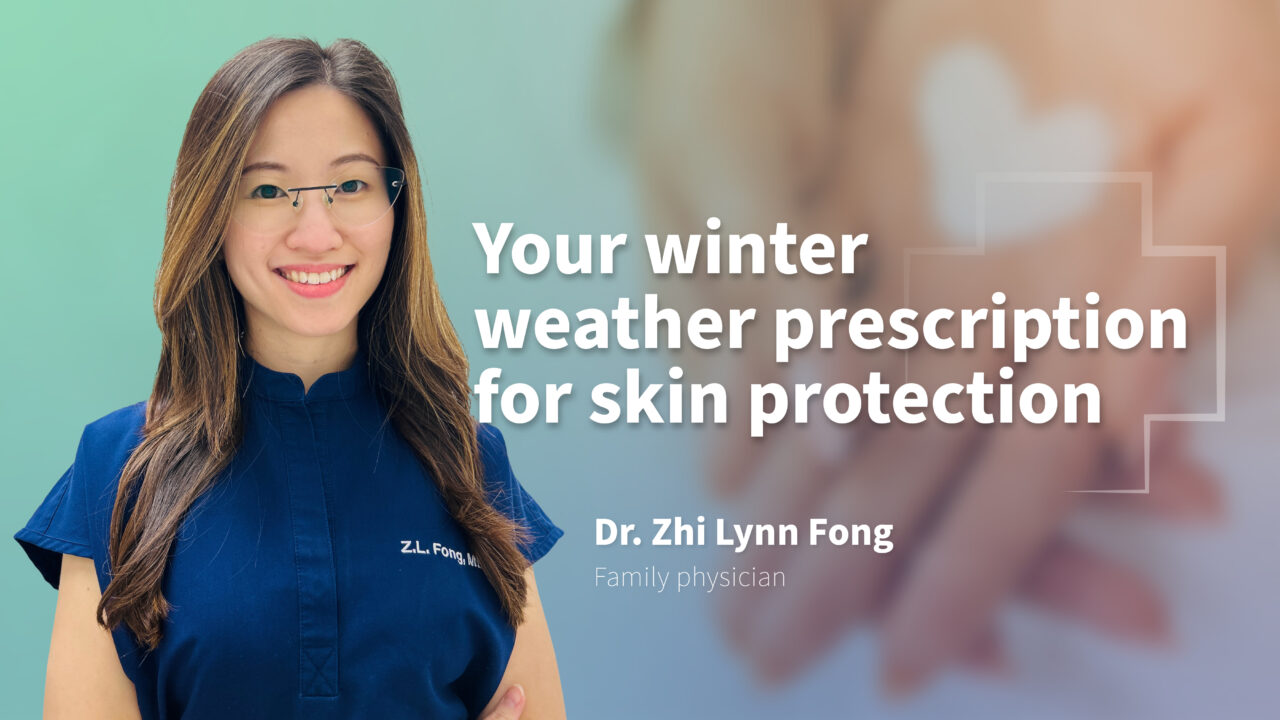During the colder months of the year, our skin can face heightened vulnerability to environmental stressors, leaving our dermatological barrier dry, broken, and painful. The freezing temperatures and biting winds, coupled with indoor heating and frequent hand washing, poses a unique set of challenges for skin health. Elevating your skincare regimen is imperative during this season. Here are some top tips from Dr. Zhi Lynn Fong, family physician, Health for All Family Health Team, for winter skincare that will help you maintain healthy skin under the harsh winter elements:
- Hydration is key: One of the most important considerations for winter skincare is staying adequately hydrated. Cold weather and indoor heating can strip your skin of moisture, leading to dryness and discomfort. Drink plenty of water throughout the day to keep your skin hydrated from the inside out. You can also use a humidifier in your home to combat the drying effects of artificial heating, especially at night in your bedroom while you are sleeping.
- Switch to a richer moisturizer: As the temperature drops, it’s time to swap your lightweight summer moisturizer for a richer, more nourishing option. Look for moisturizers with ingredients like hyaluronic acid, glycerin, and shea butter to lock in moisture and provide a protective barrier against harsh winter elements. Apply your moisturizer immediately after cleansing to seal in hydration.
- Don’t forget sunscreen: While it may be tempting to skip sunscreen during the colder months, UV rays are still present and can cause damage to your skin. Use a broad-spectrum sunscreen with at least SPF 30, and apply it to all exposed areas, including your face, neck, and hands. Sunscreen not only protects your skin from sun damage but also helps prevent premature aging.
- Gentle cleansing: Opt for a gentle, hydrating, soap-free cleanser to avoid stripping your skin of its natural oils. Harsh cleansers can exacerbate winter dryness and lead to irritation. Consider using a creamy or oil-based cleanser that effectively removes impurities without compromising your skin’s moisture balance.
- Exfoliate regularly: Exfoliation is essential in winter to slough off dead skin cells and promote cell turnover. Choose a mild exfoliant containing ingredients like alpha hydroxy acids (AHAs) or beta hydroxy acids (BHAs). However, limit exfoliation to once or twice a week to prevent over-drying. Check labels for glycolic acid, salicylic acid, mandelic acid, and lactic acid. If you find these to be over-drying, you can use them less often or at a lower concentration during winter. This also applies to retinoids used for anti-aging purposes (opt for over-the-counter retinol instead in the winter).
- Protect your lips: The delicate skin on your lips is particularly susceptible to winter’s harsh conditions. Invest in a good quality lip balm with hydrating ingredients such as beeswax, shea butter, or coconut oil, as well as sunscreen. Apply it regularly throughout the day to prevent chapping and keep your lips soft and supple.
- Warm showers, not hot: Hot showers may feel comforting in the winter, but they can strip your skin of its natural oils, leading to dryness. Opt for warm showers and limit their duration to prevent further dehydration. After showering, pat your skin dry and apply moisturizer to lock in moisture.
- Layer up: Just as you layer clothing to stay warm in winter, consider layering your skincare products. Start with a hydrating serum, followed by a moisturizer and, if needed, a facial oil. If you are acne prone, opt for non-comedogenic oils such as rosehip and squalane. The final layer should always be sunscreen, and in the winter, considering a cream formula versus a lotion or spray formula for added moisturization. This layering approach helps create a protective barrier and ensures your skin stays adequately moisturized.
Dr. Fong adds: “If you have a skin condition such as eczema or psoriasis, which can be especially aggravated during the winter, a winter skincare regimen is even more crucial to prevent or lessen flare ups. If you continue to have worsening symptoms, seek medical care because if they are left undiagnosed or untreated, it can lead to more severe secondary dermatitis.”
Winter skincare requires a thoughtful and proactive approach to combat the challenges posed by cold weather. By following these top tips, you can maintain a healthy, glowing complexion throughout the winter season. Remember, consistency is key, so make these adjustments to your skincare routine, and let your skin radiate winter beauty.
Subscribe
This article appeared in the January 2024 issue of The Link. To receive Oak Valley Health’s community newsletter, subscribe now.
